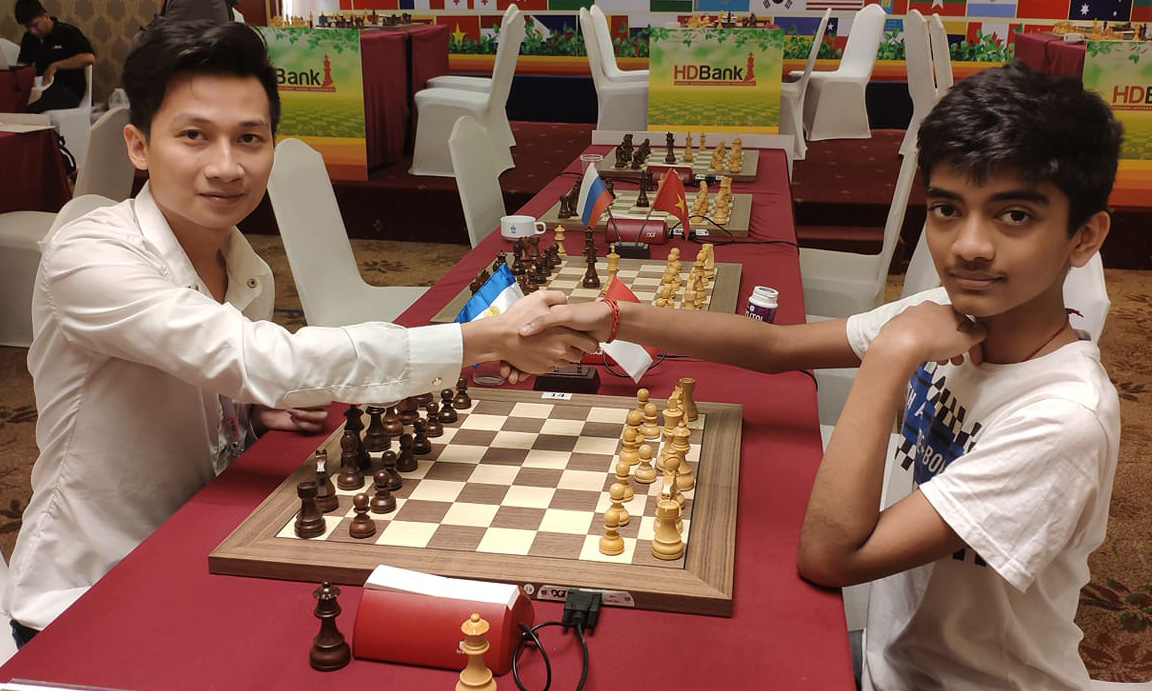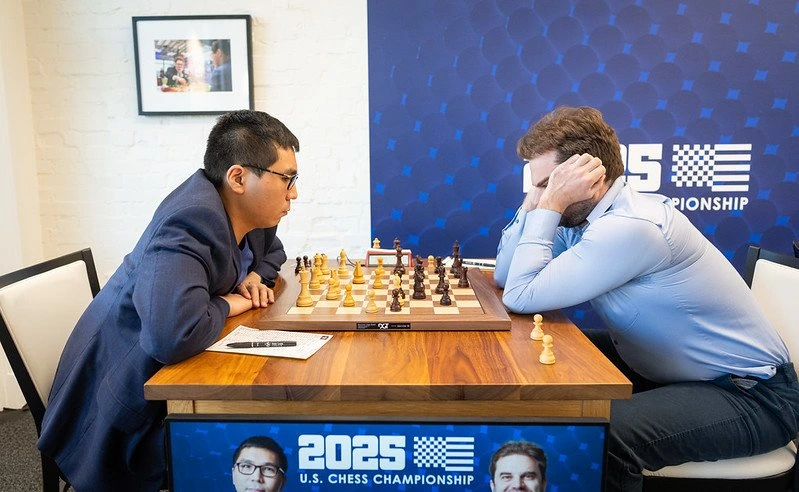Before the first move of a chess game is even played, the battle often begins days earlier — on a player’s laptop, in the quiet of a hotel room, with databases, engines, and intuition at work. Few players know that better than three-time U.S. champion Wesley So, whose precise preparation at the 2025 U.S. Chess Championship once again highlighted one of modern chess’s most decisive skills: guessing your opponent’s opening.
When So sat across from Sam Shankland in round three of the championship in St. Louis, it looked like just another early-round encounter between two elite American grandmasters. But the difference was invisible to spectators: So had correctly predicted the opening hours before the game began.
“In Uzbekistan he was playing the King’s Indian against 1.d4 and the Najdorf against 1.e4, so this tournament I thought he’d stick to the Caro-Kann,” So explained after the game.
That single prediction decided the direction of the entire battle. By move 13, So said, he was already inside his prepared line — still on familiar ground, while Shankland was not.
The Hidden Art of Pre-Game Prediction
In elite chess, opening preparation has always mattered. But in the computer era, it’s evolved into a science — and, increasingly, a game of psychology.
Top players no longer prepare every possible variation. There’s too much information, too many games, and too little time. Instead, they use patterns, memory, and psychology to predict what their opponent will play — the same way a poker player tries to read tells.
“Modern preparation is 50% knowing your opponent,” says GM Dejan Bojkov, a chess analyst and coach. “Engines give you the best moves, but humans don’t play engines. You must anticipate what a human prefers.”
In So’s case, years of experience with Shankland gave him insight. They had trained together, played side by side on U.S. teams, and faced each other numerous times. So knew his tendencies — and that made all the difference.
How a Guess Becomes an Advantage
When a player correctly predicts an opponent’s opening, it’s not just about saving time on the clock. It’s about starting the game with practical confidence and psychological comfort.
“Chess is a game of small margins,” said former world champion Vladimir Kramnik in a 2019 interview. “If you know what’s coming, you can reach positions that suit your style. If you’re surprised, even strong players can collapse.”
So’s prediction allowed him to prepare up to move 13 in the Caro-Kann — a solid, counterattacking defense for Black that Shankland trusted. But in this game, the preparation backfired. After 13…Ka8?! 14.b5!, So unleashed a powerful attack on the queenside that engines later confirmed as nearly decisive.
By the time Shankland realized his position was in danger, the damage was irreversible. So converted his advantage with trademark precision to take the sole lead in the championship, his third win against top-level competition in as many days.
The Modern Preparation Game
Today’s grandmasters have access to vast opening databases, powerful cloud engines, and software like ChessBase and Lichess tools that allow them to analyze millions of games. But even with all that, guessing correctly remains an art — because it’s impossible to prepare for everything.
Most players walk a fine line between depth and breadth of preparation.
- If they study too broadly, they know a little about everything but not enough to gain an edge.
- If they prepare too narrowly, one surprise in the opening can throw their entire plan off.
That’s where psychology and experience come in.
So, who is known for his calm, methodical approach, tends to focus on players’ habits. “I think I’m a player who’s very good at copying other people’s styles,” he said. In this case, he used that strength to predict Shankland’s choices and meet them head-on.
Even the world’s best sometimes get it wrong. In 2023, Magnus Carlsen misguessed Ian Nepomniachtchi’s opening in the Champions Chess Tour and was forced to improvise early, later calling it “an unforced error before move one.”
The Mind Games Behind the Moves
In the days leading up to major tournaments, grandmasters engage in subtle psychological maneuvering. They’ll deliberately play different openings online, hint at new ideas in interviews, or revisit old lines to confuse future opponents.
Shankland, for example, had alternated between the Najdorf Sicilian and King’s Indian setups in previous events, but switched to the Caro-Kann for this one. That could have been a strategic surprise attempt — but So’s preparation was a step ahead.
It’s a quiet arms race: every player trying to hide intentions while reading the other’s mind. As So’s victory showed, when the guess is right, the payoff can be enormous.
Beyond Memory: The Human Element
Modern players have access to “perfect” engine evaluations, but understanding why a position is good still comes down to human intuition. That’s why correct guessing isn’t just about memorization — it’s about alignment between preparation and personal comfort.
“Preparation is only powerful if you believe in it,” says GM Levon Aronian, another top competitor in St. Louis. “If you prepare a line you don’t like just because the engine says it’s fine, you won’t play it confidently.”
So’s comfort in the Caro-Kann structure — solid center, safe king, clear plan — allowed him to play confidently and quickly, while Shankland spent time recalculating his strategy. Confidence at the board can often be as decisive as the moves themselves.
Lessons for Non-Professionals
For club players and amateurs, the takeaway isn’t to memorize hundreds of opening variations. It’s to understand your opponents.
If you know your regular rival always plays 1.e4, prepare a solid response you like. If someone prefers sharp tactical battles, choose lines that slow the game down. The principle scales: in any chess game, predicting the opponent’s path helps you control the direction of the fight.
Preparation, in this sense, is about empathy — thinking like your opponent before the game begins.
Wesley So’s Quiet Formula
So’s victory over Shankland wasn’t just another point in the standings. It was a demonstration of how elite chess in 2025 is as much about mental preparation as over-the-board skill.
After the win, So credited his success not to luck or intuition, but to faith and discipline.
“Very happy! Totally unexpected,” he said. “Obviously as a Christian all wins belong to God alone, so I’m hoping to have a strong middle and finish in this event.”
For all the technology and data in chess today, the human touch remains irreplaceable — the intuition to read, to predict, to prepare.
That’s why guessing your opponent’s opening still matters. Even in the era of engines and cloud databases, the oldest skill in chess — understanding another human mind — remains the one that wins championships.

I’m Xuan Binh, the founder of Attacking Chess, and the Deputy Head of Communications at the Vietnam Chess Federation (VCF). My chess.com and lichess rating is above 2300. Send me a challenge or message via Lichess. Follow me on Twitter (X) or Facebook.

